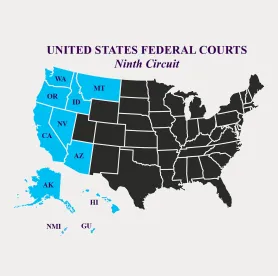The Ninth Circuit recently issued two mostly pro-employer federal Fair Credit Reporting Act (FCRA) background check decisions that held:
-
background check disclosures may contain some concise explanatory language, but there is a limit to what is explanatory and what is unlawfully extraneous;
-
background check disclosures may be presented at the same time as other materials, including application materials, as long as the background check disclosures are on a separate form;
-
language in a separate authorization form has no impact on the disclosure form’s compliance with the FCRA standalone/”consists solely” requirement; and
-
the FCRA does not mandate that the pre-adverse action letter include an express request to the applicant/employee to contact the employer directly to dispute the accuracy of the information in the background check report.
The cases are Walker v. Fred Meyer, Inc., No. 18-35592 (March 20, 2020), and Luna v. Hansen & Adkins Transport, Inc., No. 18-55804, (April 24, 2020).
Background Check Disclosures May Contain Some Concise Explanatory Language
Under the FCRA, 15 U.S.C. § 1681 et seq.,an employer that wants to obtain a background check report about a job applicant or employee must first provide the individual with a standalone document with a clear and conspicuous disclosure of the employer’s intention to do so, and the employer must obtain the individual’s authorization.
In Walker v. Fred Meyer, Inc., the Ninth Circuit evaluated the standalone requirement (also known as the “consists solely” requirement) but did not consider the clear and conspicuous requirement. (The Ninth Circuit’s principal “clear and conspicuous” case, Gilberg v. California Check Cashing Stores, was decided after Walker submitted his opening brief, so the parties did not have an opportunity to submit arguments about that standard and the district court did not consider the disclosures at issue in Walker in light of Gilberg’s definitions and holdings.)
For the standalone/“consists solely” requirement, the court held that “beyond a plain statement disclosing ‘that a consumer report may be obtained for employment purposes,’ some concise explanation of what that phrase means may be included as part of the disclosure.” (Emphasis added.) “For example, a company could briefly describe what a ‘consumer report’ entails, how it will be ‘obtained,’ and for which type of ‘employment purposes’ it may be used.” The Ninth Circuit cautioned that “any such explanation should not be confusing or so extensive as to detract from the disclosure. In other words, it must still meet the separate ‘clear and conspicuous’ requirement.”
In Walker, among other allegations, the plaintiff claimed that the FCRA disclosure violated the standalone/“consists solely” requirement “because it mention[ed] investigative consumer reports in addition to consumer reports.” An investigative consumer report (also known as an investigative background check) is “a special consumer report or portion thereof in which information on a consumer’s character, general reputation, personal characteristics, or mode of living is obtained through personal interviews with neighbors, friends, or associates of the consumer . . . .”
The Ninth Circuit expressly ruled that mentioning investigative background checks in the disclosure (e.g., “Company may obtain a consumer report, including an investigative background check”) does not violate the FCRA’s standalone/“consists solely” requirement “because investigative [background checks] are a subcategory or specific type of consumer report” (“consumer reports” are the subject of the principal FCRA “disclosure” statute), as long as the investigative background check disclosures are limited to (1) disclosing that such reports may be obtained for employment purposes and (2) “providing a very brief description of what that means.”
In its decision, the court indicated that such a passing reference was different from the separate investigative background check disclosure mandated by 15 U.S.C. § 1681d (a different FCRA section) and requiring additional information, including a “statement informing the consumer of his right to [a complete and accurate disclosure of the nature and scope of the check] and the [FCRA “A Summary of Your Rights” form].” The court suggested that including the §1681d investigative background check disclosures would amount to extraneous information that would violate the non-investigative background check standalone/“consists only” requirement under §1681b.
The Ninth Circuit reviewed the employer’s disclosure in detail and held the following about each respective paragraph of the background check disclosure at issue in Walker, which are included here for reference and discussion:
|
Language |
Court Finding |
|
We … will obtain one or more consumer reports or investigative consumer reports (or both) about you for employment purposes. These purposes may include hiring, contract, assignment, promotion, reassignment, and termination. The reports will include information about your character, general reputation, personal characteristics, and mode of living. |
Does not violate the standalone/consists solely requirement.
|
|
We will obtain these reports through a consumer reporting agency. The consumer reporting agency is General Information Services, Inc. GIS’s address is P.O. Box 353, Chapin, SC 29036. GIS’s telephone number is (866) 265-4917. GIS’s website is at www.geninfo.com |
Does not violate the standalone/“consists solely” requirement.
|
|
You may inspect GIS’s files about you (in person, by mail, or by phone) by providing identification to GIS. If you do, GIS will provide you help to understand the files, including communication with trained personnel and an explanation of any codes. Another person may accompany. You by providing identification. |
While likely included in good faith, these paragraphs do not satisfy the standalone/“consists solely” requirement.
|
Background Check Disclosures May Be Presented at the Same Time as Other Materials, but Not on the Same Form
In Luna v. Hansen & Adkins Transport, Inc., the Ninth Circuit rejected the plaintiff’s argument that the FCRA’s physical standalone/“consists solely” requirement for hard-copy forms was a temporal one. As long as the background check disclosure itself is in a standalone form, the Ninth Circuit found, it can be presented with and at the same time as other employment documents. (In Luna, all relevant items were in paper/hard-copy form. Only a few cases have examined what standalone means in the electronic, online context.)
Separate Authorization Form Language Is Irrelevant to Whether Disclosure Language Satisfies the Standalone/“Consists Solely” Requirement
In Walker, the plaintiff argued that the language of the employer’s authorization form “‘underscores the confusing and distracting nature of [the employer’s] disclosure form,’ thereby reinforcing his claim” that the disclosure in question violated the FCRA’s standalone/“consists solely” requirement. The Ninth Circuit found that “the authorization form is not relevant to the [FCRA] disclosure” form’s standalone/“consists solely” requirement where “the authorization is not included in the disclosure. Either the disclosure meets the ‘clear and conspicuous’ and ‘standalone’ requirements, or it does not; that determination does not depend on what is in a separate authorization form.”
Pre-Adverse Action Letter Does Not Have to Include an Express Request That Applicant/Employee Contact the Employer Directly to Dispute the Accuracy of the Background Check Report Information
In Walker, the Ninth Circuit concluded that while the FCRA provides a right to dispute inaccurate information in a background check report, that right does not require an opportunity for the applicant/employee to discuss his or her consumer report directly with the employer, versus with the background check company/vendor.
The FCRA “mandates that, before an employer may take adverse action against an applicant/employee based on a consumer report, the employer must provide the consumer with ‘a copy of the report’ and ‘a [copy of the FCRA “A Summary of Your Rights” form, describing] in writing . . . the rights of the consumer.” Walker argued that the FCRA also establishes a right to dispute or discuss a report directly with an employer, rather than with a consumer reporting agency—“that is, an opportunity to change the employer’s mind—before adverse action is taken.” Fred Meyer’s pre-adverse action notice did not advise Walker of a right to speak directly with the employer (just GIS) about any negative items in his consumer report.
The Ninth Circuit rejected that argument, finding that the FCRA provides no right or requirement that a pre-adverse action notice include information about contacting a consumer’s employer directly.
That said, this holding is somewhat limited. This case examined FCRA requirements. Other laws, including Title VII’s individualized assessment requirement, may require employer solicitation of applicant/employee information from the applicant/employee, either directly to/with the employer or through a third-party background check company/vendor.
Key Takeaways
Employers may want to consider reviewing their background check disclosure and authorization forms/online screens, including the method of presentation of those materials to applicants and employees, to ensure:
-
there is no surplus, extraneous language in the disclosure; and
-
the disclosure is clear and conspicuous.
In addition, employers may want to consider reviewing the online screens and/or paper forms provided by their background check companies/vendors before relying on them.
Finally, employers may want to review their pre-adverse action letters for legal compliance.





 />i
/>i

